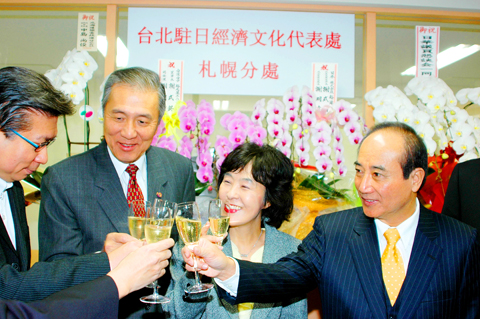Taiwan opened a representative office in Sapporo yesterday, its first new representative office in Japan in 30 years.
Legislative Speaker Wang Jin-pyng (王金平) described the opening of the office as a “breakthrough in Japan-Taiwan relations.”
Wang, along with dignitaries from Japan and Taiwan, attended a ceremony marking the opening of the office, the first since a representative office was opened in Yokohama in 1979.

PHOTO: CNA
Wang said the move was a promising development in bilateral ties and would be “a shot in the arm for tourism exchanges.”
He said that since relatively few residents of Hokkaido, of which Sapporo is the capital city, visited Taiwan, he hoped the opening of the Sapporo office would help encourage more people from the northern Japanese island to vacation in Taiwan.
“The hospitable Taiwanese people welcome Japanese visitors with open arms,” Wang said.
Addressing the ceremony, Hokkaido Governor Harumi Takahashi said Taiwan is very important to Hokkaido in terms of tourism.
“The opening of the Taiwan office in Sapporo will help facilitate Taiwanese tourists’ visits here and further bolster bilateral exchanges,” she said.
She said authorities from Hokkaido’s Kushiro sub-prefecture would give a pair of Japanese-bred red-crowned cranes to the Taipei Zoo as a token of friendship.
Shinichi Sakamoto, head of a Hokkaido tourism organization, said his organization would cooperate more closely with Taiwan’s office in Sapporo to get more people in Hokkaido interested in sightseeing in Taiwan.
Sakamoto said he believed most Hokkaido residents who had visited Taiwan would be happy to repeat their trips there, attracted by Taiwan’s delicious food, good tea and convenient high-speed railway system.
Also attending the opening were Taiwan’s top representative to Japan, John Feng (馮寄台), and Atsushi Hatanaka, chairman of the Japan Interchange Association, the de facto Japanese embassy authorized to handle civilian exchanges with Taiwan in the absence of formal diplomatic relations.
The Sapporo office is the sixth Taiwanese liaison office established in Japan, after offices in Tokyo, Osaka, Okinawa, Fukuoka and Yokohama.

The High Prosecutors’ Office yesterday withdrew an appeal against the acquittal of a former bank manager 22 years after his death, marking Taiwan’s first instance of prosecutors rendering posthumous justice to a wrongfully convicted defendant. Chu Ching-en (諸慶恩) — formerly a manager at the Taipei branch of BNP Paribas — was in 1999 accused by Weng Mao-chung (翁茂鍾), then-president of Chia Her Industrial Co, of forging a request for a fixed deposit of US$10 million by I-Hwa Industrial Co, a subsidiary of Chia Her, which was used as collateral. Chu was ruled not guilty in the first trial, but was found guilty

DEADLOCK: As the commission is unable to forum a quorum to review license renewal applications, the channel operators are not at fault and can air past their license date The National Communications Commission (NCC) yesterday said that the Public Television Service (PTS) and 36 other television and radio broadcasters could continue airing, despite the commission’s inability to meet a quorum to review their license renewal applications. The licenses of PTS and the other channels are set to expire between this month and June. The National Communications Commission Organization Act (國家通訊傳播委員會組織法) stipulates that the commission must meet the mandated quorum of four to hold a valid meeting. The seven-member commission currently has only three commissioners. “We have informed the channel operators of the progress we have made in reviewing their license renewal applications, and

‘DENIAL DEFENSE’: The US would increase its military presence with uncrewed ships, and submarines, while boosting defense in the Indo-Pacific, a Pete Hegseth memo said The US is reorienting its military strategy to focus primarily on deterring a potential Chinese invasion of Taiwan, a memo signed by US Secretary of Defense Pete Hegseth showed. The memo also called on Taiwan to increase its defense spending. The document, known as the “Interim National Defense Strategic Guidance,” was distributed this month and detailed the national defense plans of US President Donald Trump’s administration, an article in the Washington Post said on Saturday. It outlines how the US can prepare for a potential war with China and defend itself from threats in the “near abroad,” including Greenland and the Panama

A wild live dugong was found in Taiwan for the first time in 88 years, after it was accidentally caught by a fisher’s net on Tuesday in Yilan County’s Fenniaolin (粉鳥林). This is the first sighting of the species in Taiwan since 1937, having already been considered “extinct” in the country and considered as “vulnerable” by the International Union for Conservation of Nature. A fisher surnamed Chen (陳) went to Fenniaolin to collect the fish in his netting, but instead caught a 3m long, 500kg dugong. The fisher released the animal back into the wild, not realizing it was an endangered species at